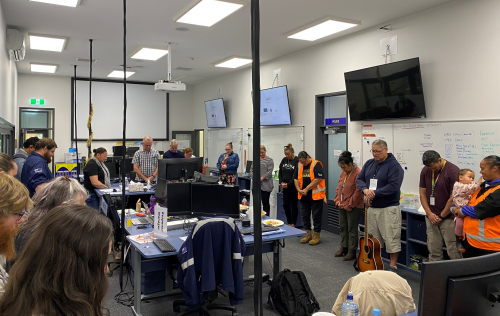

77 days after first ‘Activating’ on Friday 10 February in preparation for Cyclone Gabrielle’s approach, the Hawke’s Bay Civil Defence Emergency Management Group (HBCDEM) has ended its official response.
While the National Transition period commenced on 13 March, marking the shift out of the immediate response phase and the transition into recovery, Group Controller Ian Macdonald says HBCDEM has continued a high level of operational response support, which officially wound-up today.
“The severity and extent of Cyclone Gabrielle’s impacts on our communities and region were unprecedented, and in turn, the regional emergency response has been the most complex and large-scale ever mounted in Hawke’s Bay,” Ian Macdonald said.
“In the last 10 weeks, over 1000 people have come through to work with our 12 HBCDEM Group Office staff in the official HBCDEM response, either here at the Group Emergency Coordination Centre, the Regional Distribution Centre, or at Bridge Pa Aerodrome. Most of these people were deployed from outside of Hawke’s Bay.
“This response has been a massive multi-agency operation, relying heavily on staff from the emergency management sector, the Defence Force, central government agencies, emergency services, our councils, volunteers, and people who simply decided to roll up their sleeves and help.
“Their support has been instrumental in helping us do our job coordinating this response,” Ian Macdonald said.
Ian Macdonald said a unique feature of the response was the establishment of the Regional Distribution Centre at Tomoana Showgrounds Hawke's Bay. The Regional Distribution Centre, a partnership between HBCDEM and Ngāti Kahungunu’s Tihei Mauri Ora Response Centre, has provided rapid relief and critical welfare supplies and services to rural isolated communities.
“Supporting our isolated communities has been an ongoing focus of this response and presented some incredibly complex logistical challenges,” Ian Macdonald said.
“At the peak of the response, we were coordinating up to 25 helicopter supply missions a day, using NZDF and civilian helicopters. We eventually moved to a sustained, weekly supply cycle.
“With the ongoing repair and reinstatement of vital infrastructure, access to many isolated communities has been restored. We’re now at the point where pockets of isolated households can be supported by local district councils.
“The operation of the Regional Distribution Centre for rapid relief is something that’s never been done before, and the lessons identified from it will have national significance for New Zealand’s emergency management system,” Ian Macdonald said.
Ian Macdonald said planning for any re-escalation and being prepared for any other major event remains a key priority for the Group.
“We know the region can expect more rain through winter with the potential for other events that will challenge our communities and the region,” Ian Macdonald said.
“Enough pre-packaged supplies to sustain hundreds of households for 72 hours have been relocated to Bridge Pa Aerodrome, allowing helicopters to get these supplies out quickly if another rain event cuts off communities once again.
“The earthquakes near Pōrangahau on Wednesday are also a reminder that hazards can present at any time. Planning and preparing for re-escalation in the occurrence of another emergency event is a critical part of our ongoing work,” Ian Macdonald said.
Ian Macdonald said other priorities for HBCDEM are revising the HBCDEM Group Office work programme in the wake of Cyclone Gabrielle and maintaining the strong relationships with partners and stakeholders built during the response.
“An internal focus for us is business planning for the “new normal”. That will involve supporting recovery work, councils’ community engagement in recovery and re-escalation planning,” Ian Macdonald said.
“But right now, the immediate priority for me is to say thank you – to our Treaty partners, Māori Wardens, partner agencies, councils, emergency services, defence forces, overseas partners, NGOs, community networks and the thousands of volunteers that have supported the community through this response and transition to recovery.
“There can be a perception that Civil Defence is a separate agency that will come to the rescue in an event, but Civil Defence is all of us, the network of our communities and agencies coming together to help each other and do the mahi. That has certainly been true in this response,” Ian Macdonald said.
1 May 2023
Disclaimers and Copyright
While every endeavour has been taken by the Hawke's Bay Emergency Management to ensure that the information on this website is
accurate and up to date, Hawke's Bay Emergency Management shall not be liable for any loss suffered through the use, directly or indirectly, of information on this website. Information contained has been assembled in good faith.
Some of the information available in this site is from the New Zealand Public domain and supplied by relevant
government agencies. Hawke's Bay Emergency Management cannot accept any liability for its accuracy or content.
Portions of the information and material on this site, including data, pages, documents, online
graphics and images are protected by copyright, unless specifically notified to the contrary. Externally sourced
information or material is copyright to the respective provider.
© Hawke's Bay Emergency Management - hbemergency.govt.nz / / enquiries@hbemergency.govt.nz